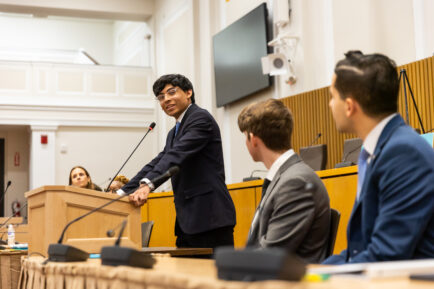How The MA Hunger Free Campus Initiative is Ending Food Insecurity for Public College Students Across The State
Last month, over 150,000 students returned to Massachusetts’ public and minority-serving higher education institutions for the spring semester. Some students are recent high school graduates, while others might be attending school for the first time in several years thanks to the MassReconnect initiative. Over one-third of Massachusetts public college students – a diverse group including full-time workers and parents – face food insecurity and are grappling with the same issues of affordability that many of our neighbors across Eastern Massachusetts are experiencing.
But many students this semester will find food resources on campus and in the community thanks to the Massachusetts Hunger-Free Campus Initiative, a program advanced through a statewide coalition co-led by The Greater Boston Food Bank (GBFB). Over the past two years, 30 public and minority-serving institutions of higher education have received funds through the Massachusetts Hunger-Free Campus Initiative to implement food security initiatives on campus tailored to the unique needs of their students and community. Several campuses partner with local food pantries, including the Salem Pantry, the Family Pantry of Cape Cod, and Food For Free, all of which receive food from GBFB. By ensuring they have the food to fuel them towards graduation, the Hunger Free Campus Initiative is giving students the opportunity to pursue their dreams and a life in Massachusetts post-graduation.
“I worry all the time about what I can feed my kids, but now I can go to school and focus on my education,” said a Middlesex Community College student, referring to program expansion funded through the Hunger-Free Campus Initiative.
The Massachusetts Hunger-Free Campus Coalition (HFCC) founded in 2019 and led by GBFB, the Food Bank of Western Massachusetts, and the Massachusetts Law Reform Institute, works to advance legislative and budget campaigns to permanently establish and fund the Hunger Free Campus Initiative. The HFCC rose in response to persistent food insecurity on campuses in Massachusetts and prioritizes student needs and student voices.

Currently, the HFCC is advocating for $2 million in the FY25 state budget for the Initiative and to pass an Act establishing the Hunger Free Campus Initiative (S835 / H1293). The legislation is sponsored by Representative Andy Vargas (D-Haverhill) and Senator Joan Lovely (D-Salem). The Hunger-Free Campus Initiative is one of GBFB’s many advocacy priorities. Your voice can be heard by signing up for our advocacy updates and supporting our efforts on Capitol Hill and Beacon Hill.
